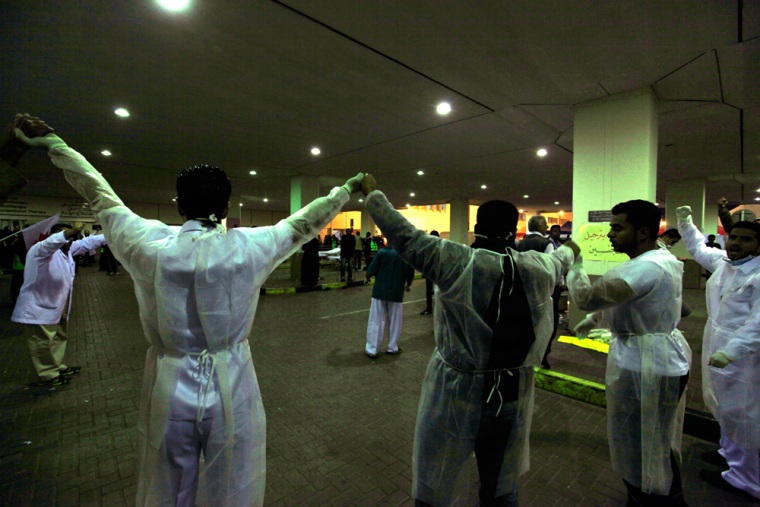Bahrain's special security court on Thursday sentenced a protester to death for killing a policeman, and gave doctors and nurses who had treated injured protesters during the country's uprising earlier this year lengthy prison sentences, a lawyer said.
Attorney Mohsen al-Alawi said the tribunal, set up during Bahrain's emergency rule, convicted and sentenced 13 medical professionals each to 15 years in prison.
In addition, two doctors were sentenced to 10 years each while seven other medics convicted on Thursday got shorter prison terms of 5 years each.
Thursday's harsh sentences suggest the Sunni authorities in the Gulf kingdom will not relent in pursing and punishing those they accuse of supporting the Shiite-led opposition and participating in dissent that has roiled the tiny island nation.
Earlier this year, the same special court sentenced two other protesters to death for killing a police officer in a separate incident.
Al-Alawi, the lawyer, said the 22 medical professionals, who were charged with various anti-state crimes, and the protester who got the death sentence on Thursday can appeal their verdicts.
Hundreds of activists have been imprisoned since March when Bahrain's rulers imposed martial law to deal with protests by the country's Shiite majority demanding greater rights and freedoms.
Opposition activists and many ordinary Bahrainis also occupied a roundabout in Manama in February to demand reforms.
Closely-watched process
More than 30 people have been killed since the protests began that month, inspired by the Arab Spring uprisings elsewhere.
The Sunni monarchy that rules this strategically important Gulf nation, which is home to the U.S. Navy's 5th Fleet, responded with a violent crackdown.
In crushing the protests, Bahrain said the demonstrators had Shiite sectarian aims and Iranian backing. Saudi Arabia, fearing it would lose a Gulf ally to Iran, also sent in troops.
Thursday's sentences came a day after the tribunal upheld sentences for 21 activists convicted for their roles in the protests, including eight prominent political figures who were given life terms on charges of trying to overthrow the kingdom's Sunni rulers.
The court's decision reflected the authorities' unwillingness to roll back punishments for those considered central to the anti-government uprising, although officials have taken some steps to ease tensions.
They include releasing some detainees and reinstating state workers purged for suspected support of the seven-month-old protest movement.
The doctors' trial has been closely watched by rights groups, which have criticized Bahrain's use of the security court, which has military prosecutors and both civilian and military judges, in prosecuting civilians.
Shiites want political reforms that would give parliament legislative clout and remove a prime minister from the ruling Al Khalifa family who has occupied the post since 1971.
The government, which has been pressed by its ally Washington to talk to leading opposition party Wefaq, says it will allow parliament more powers to monitor cabinet ministers and that the ongoing clashes are holding up economic recovery.
